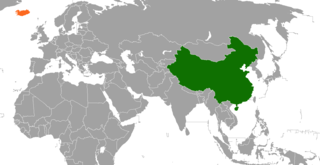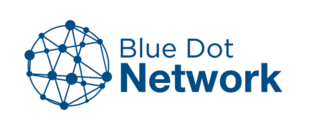Related Research Articles

The Export–Import Bank of the United States (EXIM) is the official export credit agency (ECA) of the United States federal government. Operating as a wholly owned federal government corporation, the bank "assists in financing and facilitating U.S. exports of goods and services", particularly when private sector lenders are unable or unwilling to provide financing. Its current chairman and president, Reta Jo Lewis, was confirmed by the Senate on February 9, 2022.
A green economy is an economy that aims at reducing environmental risks and ecological scarcities, and that aims for sustainable development without degrading the environment. It is closely related with ecological economics, but has a more politically applied focus. The 2011 UNEP Green Economy Report argues "that to be green, an economy must not only be efficient, but also fair. Fairness implies recognizing global and country level equity dimensions, particularly in assuring a Just Transition to an economy that is low-carbon, resource efficient, and socially inclusive."

The Japan Bank for International Cooperation, JBIC, is a Japanese public financial institution and export credit agency that was created on October 1, 1999, through the merger of the Japan Export-Import Bank (JEXIM) and the Overseas Economic Cooperation Fund (OECF).

The energy policy of the European Union focuses on energy security, sustainability, and integrating the energy markets of member states. An increasingly important part of it is climate policy. A key energy policy adopted in 2009 is the 20/20/20 objectives, binding for all EU Member States. The target involved increasing the share of renewable energy in its final energy use to 20%, reduce greenhouse gases by 20% and increase energy efficiency by 20%. After this target was met, new targets for 2030 were set at a 55% reduction of greenhouse gas emissions by 2030 as part of the European Green Deal. After the Russian invasion of Ukraine, the EU's energy policy turned more towards energy security in their REPowerEU policy package, which boosts both renewable deployment and fossil fuel infrastructure for alternative suppliers.

A green-collar worker is a worker who is employed in an environmental sector of the economy. Environmental green-collar workers satisfy the demand for green development. Generally, they implement environmentally conscious design, policy, and technology to improve conservation and sustainability. Formal environmental regulations as well as informal social expectations are pushing many firms to seek professionals with expertise with environmental, energy efficiency, and clean renewable energy issues. They often seek to make their output more sustainable, and thus more favorable to public opinion, governmental regulation, and the Earth's ecology.
Energy in Kazakhstan describes energy and electricity production, consumption and import in Kazakhstan and the politics of Kazakhstan related to energy.
The Export–Import Bank of China is one of two institutional banks in China chartered to implement the state policies in industry, foreign trade, economy, and foreign aid to other developing countries, and provide policy financial support so as to promote the export of Chinese products and services.

China–Iceland relations formally began on 8 December 1971, when Iceland recognised Beijing. Prior to the signing of a Free Trade Agreement between the two countries in 2013, diplomatic activities between them were relatively few in number. However, since this event, political cooperation has increased. There is growing number of economic and cultural ties, as their political partnership has expanded.

The energy policy of Malaysia is determined by the Malaysian Government, which address issues of energy production, distribution, and consumption. The Department of Electricity and Gas Supply acts as the regulator while other players in the energy sector include energy supply and service companies, research and development institutions and consumers. Government-linked companies Petronas and Tenaga Nasional Berhad are major players in Malaysia's energy sector.
A Green bond is a fixed-income financial instruments (bond) which is used to fund projects that have positive environmental and/or climate benefits. They follow the Green Bond Principles stated by the International Capital Market Association (ICMA), and the proceeds from the issuance of which are to be used for the pre-specified types of projects.

People's Republic of China – Zambia relations refers to the current and historical relationship between the People's Republic of China (PRC) and Zambia.
Energy use and development in Africa varies widely across the continent, with some African countries exporting energy to neighbors or the global market, while others lack even basic infrastructures or systems to acquire energy. The World Bank has declared 32 of the 48 nations on the continent to be in an energy crisis. Energy development has not kept pace with rising demand in developing regions, placing a large strain on the continent's existing resources over the first decade of the new century. From 2001 to 2005, GDP for over half of the countries in Sub Saharan Africa rose by over 4.5% annually, while generation capacity grew at a rate of 1.2%.

The Belt and Road Initiative, known within China as the One Belt One Road or OBOR/1B1R for short, is a global infrastructure development strategy adopted by the Chinese government in 2013 to invest in more than 150 countries and international organizations. It is considered a centerpiece of the Chinese leader Xi Jinping's foreign policy. The BRI forms a central component of Xi's "Major Country Diplomacy" strategy, which calls for China to assume a greater leadership role for global affairs in accordance with its rising power and status. It has been compared to the American Marshall Plan. As of August 2023, 155 countries were listed as having signed up to the BRI. The participating countries include almost 75% of the world's population and account for more than half of the world's GDP.

The Silk Road Fund is a China Government Guidance Fund to foster increased investment in countries along the Belt and Road Initiative, an economic development initiative primarily covering Eurasia. The Chinese government pledged US$40 billion for the creation of the investment fund established on 29 December 2014.
Emba Hunutlu power station is a 1320 MW coal fired power station in Turkey in Adana Province. As of 2022 it is the largest Chinese foreign direct investment in the country. Despite opposition from many environmental organisations the plant was started up in 2022 and burns Russian coal as it is cheaper than other coal. The plant is less than 2 km from another coal-fired power station, İsken Sugözü.
The China-LAC Cooperation Fund is a multilateral investment and financing cooperation fund established by the Chinese government. The CLAC Fund is divided into a US$2 billion co-financing facility and US$3 billion investment fund. Both the co-financing facility and fund support investments and projects in Latin America and the Caribbean.

The European Green Deal, approved in 2020, is a set of policy initiatives by the European Commission with the overarching aim of making the European Union (EU) climate neutral in 2050. The plan is to review each existing law on its climate merits, and also introduce new legislation on the circular economy, building renovation, biodiversity, farming and innovation.

The Blue Dot Network (BDN) is a joint project of the United States, Japan, and Australia that supports investment in high-quality infrastructure projects around the world. The BDN works to raise money from investors by certifying projects to strict quality standards.
Sustainable finance is the set of financial regulations, standards, norms and products that pursue an environmental objective. It allows the financial system to connect with the economy and its populations by financing its agents while maintaining a growth objective. The long-standing concept was promoted with the adoption of the Paris Climate Agreement, which stipulates that parties must make "finance flows consistent with a pathway towards low greenhouse gas emissions and climate-resilient development." In addition, sustainable finance had already a key role to play in the European Green Deal and in other EU International agreements, but since the COVID-19 pandemic its role is even more important.
References
- ↑ "Special Policy Study on Green Belt and Road and 2030 Agenda for Sustainable Development" (PDF). International Institute for Sustainable Development. Archived from the original (PDF) on 2019-11-17. Retrieved 2019-11-26.
- ↑ "Guidance on Promoting Green Belt and Road". Ministry of Ecology and Environment.
- ↑ "DRC and China EximBank release report on green finance for Belt and Road". Development Research Center of the State Council.
- 1 2 "Greener Power Projects for the Belt & Road Initiative (BRI)". Natural Resources Defense Council. 22 April 2019.
- ↑ "Bolstering the Belt and Road Initiative through green finance". China Daily. April 26, 2019.
- ↑ Geis, Ruediger (March 19, 2019). "Can the Belt and Road Initiative Be Green?". Brink.
- ↑ Yu, Enoch (May 7, 2017). "London calling: green finance, belt and road the latest China business push". South China Morning Post.
- ↑ "The Role of Investors in Promoting Sustainable Infrastructure Under the Belt and Road Initiative" (PDF). Chatham House.
- ↑ "White Paper on Green Finance" (PDF). The Export-Import Bank of China.
- ↑ "Leveraging China's "Green Soft Power" For Responsible Belt and Road Initiative Investment". Forbes. May 14, 2019.
- ↑ Xiong, Minpeng; Yang, Xiaowen; Chen, Sisi; Shi, Fulian; Yuan, Jiahui (October 4, 2019). "Environmental Stress Testing for China's Overseas Coal Power Investment Project". Sustainability. 11 (19): 5506. doi: 10.3390/su11195506 .
- ↑ "China's top two banks won't finance controversial Adani coal mine in Australia". Reuters. December 4, 2017.
- ↑ "China Avoids Coal Projects in Belt and Road for First Time". au.finance.yahoo.com. Archived from the original on 2021-08-13. Retrieved 2021-08-13.
